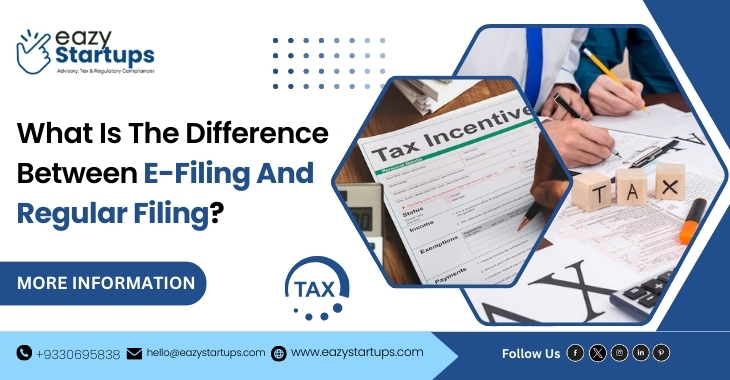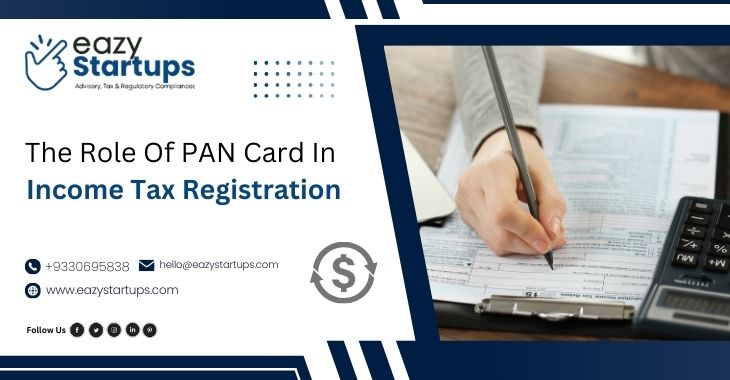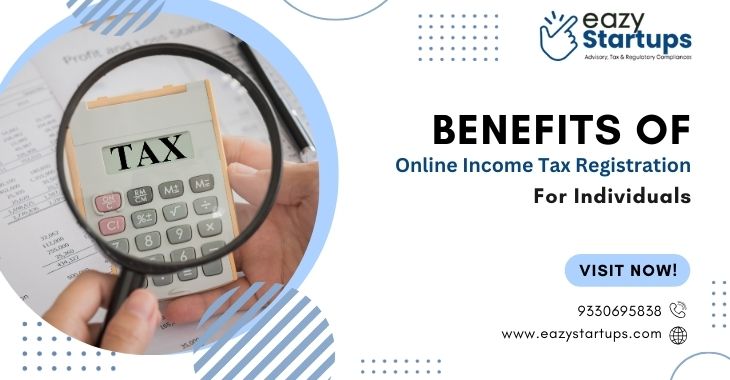As technology continues to reshape how we handle financial matters, understanding the differences between electronic filing (e-filing) and traditional paper filing becomes increasingly important. If you want to complete Online Income Tax Filing, contact Eazy Startups for a flawless process.
Let’s explore the key distinctions between these two methods of submitting tax returns:-
- Processing Time and Efficiency
- Accuracy and Error Prevention
- Cost and Resource Implications
- Documentation and Record Keeping
- Security and Privacy Concerns
- Flexibility and Amendments
- Payment and Refund Options
Processing Time and Efficiency:
E-filing stands out significantly when it comes to processing speed. When you submit electronically, your return enters the tax department’s system immediately, and processing typically begins within 24-48 hours. In contrast, regular paper filing involves physical transportation, manual data entry, and significantly longer processing times. A paper return might take 6-8 weeks just to be processed, not counting the time it spends in transit. Think of e-filing as an express train and paper filing as a local train – both reach the destination but at very different speeds.
Accuracy and Error Prevention:
Electronic filing systems come with built-in error-checking capabilities. These systems automatically scan for mathematical errors, missing fields, and incorrect social security numbers before allowing submission. It’s like having a proofreader checking your work in real time. Regular filing, being entirely manual, lacks these safeguards. When filing paper returns, simple mathematical mistakes or overlooked fields might not be caught until the return is processed, leading to delays or rejection. Studies show that the error rate in paper returns is significantly higher, around 21%, compared to less than 1% in e-filed returns.
Cost and Resource Implications:
While e-filing might require payment for software or online services, it often proves more economical in the long run. You save on printing costs, postage, and certified mailing fees. Regular filing incurs expenses for paper, printing, envelopes, and secure mailing services. Additionally, consider the hidden costs – time spent organizing papers, making copies for records, and travelling to the post office. E-filing eliminates these physical resource requirements and reduces the environmental impact of paper consumption.
Documentation and Record Keeping:
E-filing provides immediate digital confirmation of your submission, complete with a unique transaction ID. All documents are stored electronically, making them easy to access, search, and retrieve when needed. Regular filing requires manual organization of paper documents, physical storage space, and careful tracking of mailing receipts. With paper filing, you must maintain physical copies for several years, risking damage, loss, or deterioration. Digital records from e-filing can be backed up multiple times and accessed from anywhere with internet connectivity.
Security and Privacy Concerns:
Contrary to what some might think, e-filing typically offers enhanced security features. Electronic submissions are encrypted and transmitted through secure channels, making them difficult to intercept or tamper with. Paper returns, however, pass through multiple hands and physical locations, potentially exposing sensitive information to theft or loss. While both methods have security protocols, E-filing’s digital security measures are continuously updated to combat new threats, whereas physical security for paper documents remains relatively unchanged.
Flexibility and Amendments:
E-filing offers greater flexibility in making last-minute changes or corrections before submission. You can easily review and modify your return until you’re ready to submit. With paper filing, any mistakes discovered after printing mean starting over with new forms. Additionally, some e-filing systems save your information from previous years, making future filing faster and easier. Paper filing requires manually inputting all information each time, increasing the chance of transcription errors.
Payment and Refund Options:
Electronic filing opens up more options for handling payments and refunds. You can link bank accounts for direct deposit of refunds or schedule tax payments for future dates. Regular filing limits you to checks or money orders for payments, and refunds typically come as physical checks in the mail. The difference in refund time is substantial – e-filed returns with direct deposit often receive refunds within 21 days, while paper returns might take two months or longer.
Wrap Up
Both e-filing and regular filing accomplish the same goal of submitting your tax returns, but they differ significantly in efficiency, accuracy, and convenience. While some people might prefer the familiarity of paper filing, the advantages of e-filing are compelling enough to make it the preferred choice for most taxpayers. If you want to complete Online Income Tax Filing, contact Eazy Startups for a flawless process.











Recent Comments